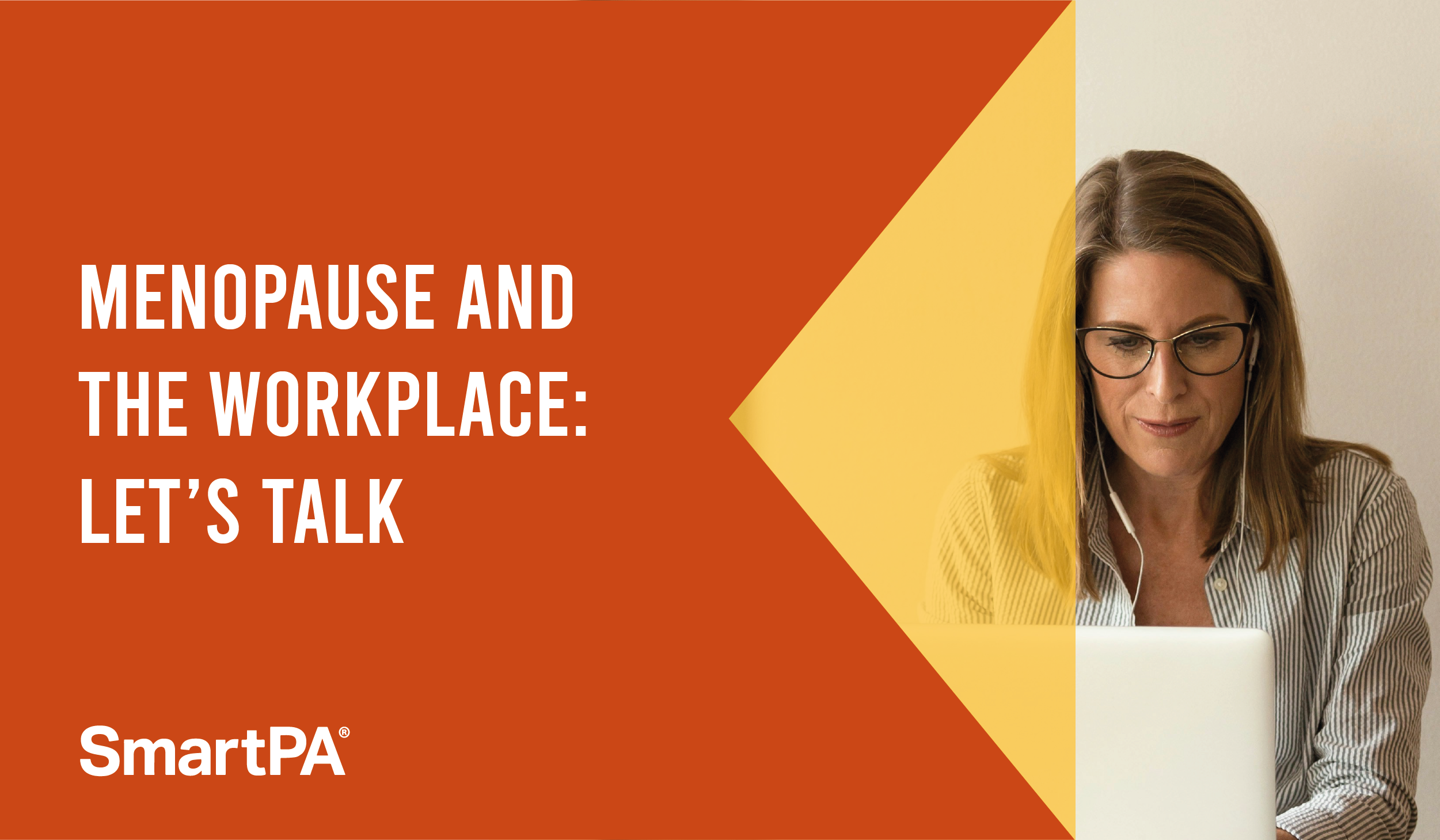Managing the menopause … and the perimenopause
Why, you might be thinking, is a 45 year old writing about the menopause? After all, isn’t that something that happens to women in their 50s? And, while we’re at it, what is the perimenopause and why are SmartPA writing about it?
On average, the menopause occurs in women at the age of 51. Strictly speaking, the menopause is a one-off event marking the one-year anniversary of a women’s last period and reproductive years (I only found this out a few years ago!) although many of the symptoms we commonly associate with ‘menopause’ can last for many years thereafter.
The perimenopause on the other hand usually starts late thirties / early forties and is the precursor to menopause. During this phase, women may face a wide range of symptoms including menstrual cycle changes, hot flushes, night sweats, headaches and joint and muscle pains,
At SmartPA we employ, train, coach and mentor thousands of women each year, with the largest % of our female community aged 30-55. So understanding how this chapter of our lives impacts our performance and careers is vital. Most importantly, we need to understand how we can support and empower ourselves and our people to navigate and flourish in this journey.
Get hormones into the boardroom
We need to remove the mystery from the menopause and the perimenopause, particularly in the workplace. Stripping away the cultural hangover from the ‘traditional’ workplace, which has been designed around male norms, will empower women and men alike to get comfortable talking about what has always been seen as an ‘awkward’ topic..
For workplace leaders, it’s a topic that should be embraced. The menopause can have a significant impact on the daily lives of employees, leading to a negative impact on their performance and attendance at work.
Given that midlife women make up a sizable proportion of the global workforce, the impact of menopause symptoms on absenteeism, productivity and lost opportunities for career advancement are significant. Indeed, the UK Parliament’s recent ‘Menopause and the workplace’ report cites 14 million working days lost to menopause every year, equating to £1.88 billion in lost productivity.
Lost my mojo
The complex biological process associated with the hormonal change can lead to a range of symptoms, including brain fog, wandering mind, difficulty focusing, anxiety, low mood, lack of energy, and a feeling that you’ve lost your ‘mojo’ I can vouch from personal experience that all of these symptoms impact an individual’s physical and mental well-being and can affect productivity, quality of work and self-esteem.
What’s more, menopausal women can face specific challenges in career advancement due to traditional biases and stereotyping. This hinders their professional growth and limits opportunities for career development.
I’ve been there. Sitting in team meetings and board meetings having a complete mind blank, losing a key message midsentence, and then worrying about what your colleagues and peers are thinking about you. “Is she losing her mind?” “Is she still capable?”. (Spoiler: the answer is yes, she’s still capable! )
What can we do?
Creating a perimenopause and menopause-friendly workplace is not just about meeting legal obligations. It’s about fostering a culture of inclusivity, understanding, and support. Recognising the unique challenges faced by menopausal women and providing effective support is a big step towards an equitable and harmonious work environment, ensuring women feel supported and empowered to thrive during this significant life transition.
Here's our 5 step plan to creating a menopause-friendly workplace:
- Appoint Ambassadors:
Encouraging an open dialogue about menopause reduces stigma and fosters a supportive environment. Consider appointing peri and menopausal ambassadors who will host educational workshops. Supply informational materials on how to navigate these lifecycle challenges and create safe spaces for discussions and peer-to-peer support.
- Support flexible work arrangements:
Think about how your current work arrangements accommodate the varying needs of menopausal women. Consider flexible hours, remote working options or shorter workweeks to allow women to manage their symptoms effectively.
- Monitor workplace temperatures:
Hot flushes are a common symptom of menopause, leading to discomfort and embarrassment to sufferers. Can you give access to adjustable thermostats, cooling fans? Is your dress code flexible enough to accommodate individual comfort?
- Offer mental health support:
Employee assistance programs and access to counselling can help women navigate the emotional challenges associated with menopause.
- Adopt inclusive policies:
Review and update your workplace policies to ensure inclusivity. Make sure they specifically address menopause and include provisions for sick leave or accommodation requests.
About Sarra and SmartPA
A career admin professional, Sarra Bejaoui is the founder of SmartPA. SmartPA is a pioneer of remote, outsourced admin and business support, providing individual SmartPAs, multi-skilled cross-functional teams, and full lift and drop admin process outsourcing. Working with more than 5,000 businesses of all sizes world-wide, SmartPA draws on a global talent pool of accredited SmartPAs, with a Centre of Excellence based in the UK, near shore hubs in South Africa and Uganda, and an offshore hub in Malaysia.
